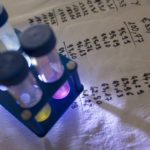Lien vers Pubmed [PMID] – 30525104
Lien DOI – 10.1126/sciadv.aau1873
Sci Adv 2018 Dec; 4(12): eaau1873
An essential property of microbial communities is the ability to survive a disturbance. Survival can be achieved through resistance, the ability to absorb effects of a disturbance without a notable change, or resilience, the ability to recover after being perturbed by a disturbance. These concepts have long been applied to the analysis of ecological systems, although their interpretations are often subject to debate. Here, we show that this framework readily lends itself to the dissection of the bacterial response to antibiotic treatment, where both terms can be unambiguously defined. The ability to tolerate the antibiotic treatment in the short term corresponds to resistance, which primarily depends on traits associated with individual cells. In contrast, the ability to recover after being perturbed by an antibiotic corresponds to resilience, which primarily depends on traits associated with the population. This framework effectively reveals the phenotypic signatures of bacterial pathogens expressing extended-spectrum β-lactamases (ESBLs) when treated by a β-lactam antibiotic. Our analysis has implications for optimizing treatment of these pathogens using a combination of a β-lactam and a β-lactamase (Bla) inhibitor. In particular, our results underscore the need to dynamically optimize combination treatments based on the quantitative features of the bacterial response to the antibiotic or the Bla inhibitor.


